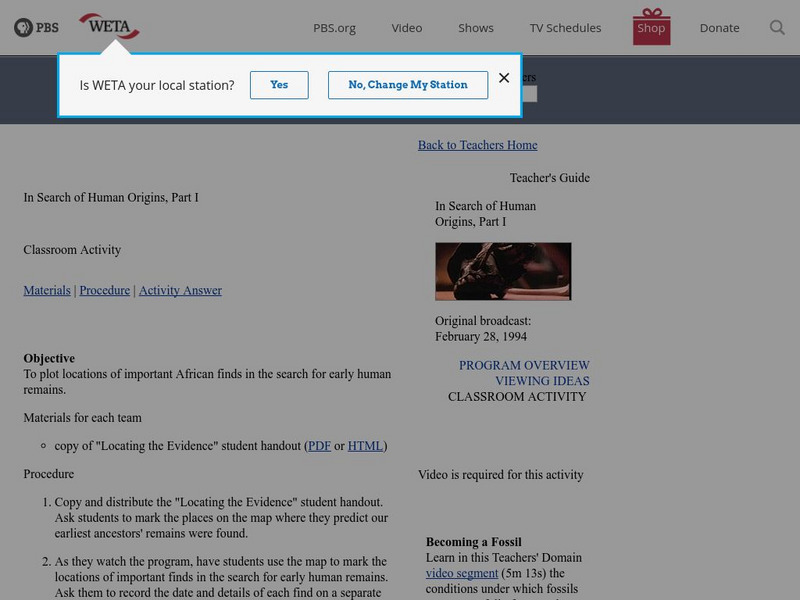Hi, what do you want to do?
Curated OER
About Abraham Lincoln
Fifth graders complete a variety of activities and exercises as they study the life, policies, and lasting influence of Abraham Lincoln.
Curated OER
What is Migration
Students conduct individual research and participate in discussion be able to identify difference between forced and voluntary migration. They identify if push and pull factors are caused by political, social, economic, or environmental...
Curated OER
The Institutions of Government: The Judiciary
Students explain the difference between tribal, state and federal sovereignty. Using the internet, they read Supreme Court cases that focus on Native American law. They compare and contrast the view of the case from the Native...
Curated OER
Breaking News English: Anti-McDonald's McDavids Beat Goliath
For this English worksheet, students read "Anti-McDonald's McDavids Beat Goliath," and then respond to 8 multiple choice, 27 fill in the blank, 7 short answer, 20 matching, and 8 true or false questions about the...
Curated OER
Give Me The C and D Canal!!!
Young scholars estimate the distance from Baltimore to Philadelphia via the water route before the Chesapeake and Delaware Canal was built. Students study canals and how transportation and economic necessities dictate the building of a...
Curated OER
Give Me the C and D Canal!!!
Students estimate the distance between Baltimore to Philadelphia via the water route before the Chesapeake and Delaware Canal was built. They familiarize themselves with canals and how transporation and economic necessities dictate the...
Curated OER
How Things Fly
Students conduct a series of hands-on experiments that help them explain the role of lift in fixed-wing flight. They observe the flow of air and water around several surfaces and then consider the dynamics of airflow around an aircraft...
Curated OER
Lesson 6: Native Americans in the West
Students recall their knowledge of Native American people who lived in the West and reflect on how their perspectives differed from pioneers and argonauts of the 19th century.
Curated OER
Science
Third graders study light and shadow, participate in mirror activities, and build a periscope.
Curated OER
Dorothea Dix: Reform in Massachusetts
High schoolers examine the life and reform efforts of Dorothea Dix on behalf of people with disabilities. They discover how her efforts resulted in the passage of legislation. They also examine the care people with disabilities receive.
Curated OER
Inventors and Innovators
Students explore the scientific enterprise and the contributions of diverse people. They explore some of the more practical applications of the scientific enterprise. Students describe how the cast cooler works, and discuss how inventor...
Curated OER
Cabeza de Vaca Meets the Coahuiltecans
Learners examine the difference between primary and secondary sources by examining the journal of Cabeza de Vaca and creating a poster about the Coahuitecan Indian groups. They portray a scene of the groups in 16th Century south Texas.
Curated OER
Biology Chapter 15 Word Search Puzzle
In this biology worksheet, middle schoolers look for the words that are related to the theme of the worksheet. They also work on the skills of spelling and word recognition.
Other
Bradshaw Foundation: Journey of Mankind
An interactive map that shows how early humans traveled out of Africa and spread throughout the world. Starts from pre-150,000 B.C. and shows the history of how humans were able to populate the world. At each step there is information...
A&E Television
History.com: What Prehistoric Cave Paintings Reveal About Early Human Life
Some of the oldest known art may hint at the beginning of language development, while later examples portray narratives with human and animal figures. What does the oldest known art in the world tell us about the people who created it?...
Smithsonian Institution
National Museum of Natural History: African Voices: History
Trace Africa's history from the earliest humans to modern times using this thematic timeline. Learn about African trade, religion, empires, and technology. Vibrant pictures are included for each time period showcasing the African culture.
A&E Television
History.com: How Early Humans Survived the Ice Age
The most recent ice age peaked between 24,000 and 21,000 years ago, when vast ice sheets covered North America and northern Europe, and mountain ranges like Africa's Mt. Kilimanjaro and South America's Andes were encased in glaciers. At...
Smithsonian Institution
National Museum of Natural History: What Does It Mean to Be Human, Human Characteristics
Explore walking upright, tools and food, bodies, brains, social life, language and how humans ultimately changed the world. Excellent charts, pictures and videos accompany easy-to-understand text on the earliest humans.
National Endowment for the Humanities
Neh: Edsit Ement: Eyewitness to History (Lesson Plan)
Understanding the important events in United States history and being able to recognize how history affects current events are crucial skills for students. This lesson plan lets them examine and analyze important milestones through...
Khan Academy
Khan Academy: Activity: Human Migration Patterns
Use this activity to figure out where the first humans lived. This activity requires students to read clues and use their understanding of the clues to create a map to give them a visual representation of early humans movements.
Khan Academy
Khan Academy: Video Transcripts
A page that holds all the transcripts for videos included in the early human unit.
The Henry Ford
Early 20th Century Migration: Transportation: Past, Present and Future [Pdf]
A teacher's guide and unit plan that explores the migration of people from within and to the United States in the early 20th century up to the present day, many of them to work in the automobile factories in the northern US. Additional...
PBS
Pbs Teachers: In Search of Human Origins, Part I: Classroom Activity
This lesson plan allows students to identify and plot the locations of important African finds in the search for early human remains.

























